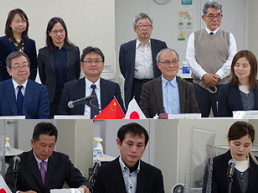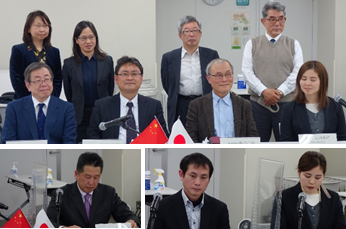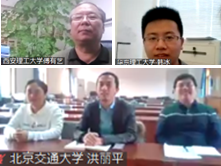
Holding of the 2nd online workshop on human resource capacity building cooperation for China on Mar. 2021
<EE&C capacity building>
Under the instruction and financial support of the Ministry of Economy, Trade and Industry (METI), the Energy Conservation Center, Japan (ECCJ) is implementing a project for China. The main topic in the current fiscal year has been taken as energy conservation in public institutions consisting of universities and hospitals. On March 9 and 10, 2021, ECCJ held the 2nd Online Workshop together with its Chinese counterpart, the National Energy Conservation Center (NECC), targeting the university and hospital fields with the intention of promoting energy conservation. There was participation by 43 persons from divisions promoting energy conservation in Chinese universities and hospitals, together with other energy conservation-related persons and experts from Japan and China.
 |  |
| Views of the lecture venue on the Japanese side and lecturers | Views of several of the participants on the Chinese side |

View of NECC (representative:Right)
making introductory speech
Under the instruction and financial support of METI, ECCJ has been implementing a cooperation project bilaterally between China and Japan since 2006. Activities include the provision of information for developing energy conservation legal systems which will form the core of energy conservation promotion, support for human resource capacity building related to the development of systems for promoting energy conservation in China, and support for the training of energy managers. Currently, specific fields that have high needs are selected, and cooperation and interchanges are implemented through holding seminars and workshops to disseminate and promote energy conservation. The project in the current fiscal year has a topic of energy conservation dissemination focused on public institutions consisting of universities and hospitals, which is a topic of great interest in China. Continuing from the first workshop that was held in November 2020, the second workshop was also held in an online format this time and consisted of the following items intended to promote energy conservation.
(1) Policy and related activities: ECCJ gave explanations on the recent Japanese policy statement and related studies for carbon neutral, and also Japanese policy measures relating to universities and hospitals including political benchmarking for unversities, and provided an overall perspective of energy conservation in these fields. The Chinese side also gave explanations about government policies regarding the promotion of energy conservation in universities with the intention of sharing awareness among the participants.(2) Efficient air conditioning, energy supply and cogeneration: Regarding items including air conditioner optimization and its simulations, air conditioner automatic operation, overviews of cogeneration as an effective measure for achieving efficient heat supply in hospitals and actual case examples of its application in hospitals, ECCJ gave explanations from the viewpoints of the facilities and cogeneration systems to deepen the understanding of the participants.
(3) Excellent energy conservation case examples in hospitals: Explanation was made on a hospital rebuilding with an energy conservation basic policy adopted, implementing energy efficient facilities and systems with realizing energy savings.
(4) Energy conservation practice in universities and the application of ESCOs: ECCJ gave detailed explanations of aspects including university energy conservation policies, infrastructure, methods, technologies, IT with AI applications and case examples, and responded to requests from many Chinese participants to share information relating to specific advancements.
A highly worthwhile activity for promoting energy conservation was achieved through the participation in the first and second online meetings of a combined total of 109 persons related to energy conservation at universities and hospitals.

